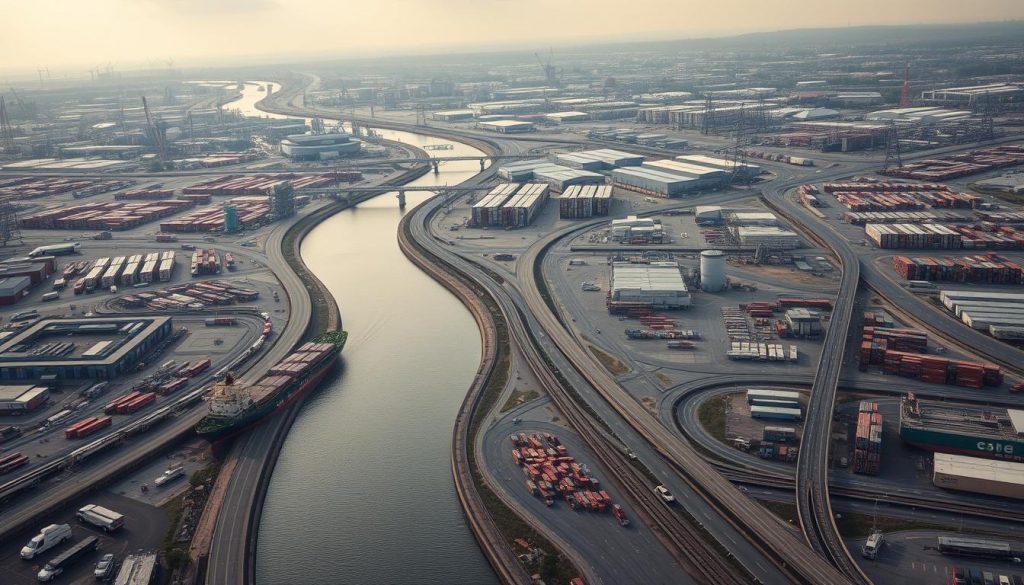Could a single cyber attack cripple a major UK car maker and reshape manufacturing resilience? This question looms as fresh news lands from September 2025, when a digital incident forced a halt to work at key sites.
The group closed factories in Solihull, Halewood, and Wolverhampton after an attack that affected some data and halted production for days.
About 1,000 cars are usually built each day, so lost output has mounted quickly. Dealerships and suppliers felt immediate strain as systems were taken offline and staff were sent home.
Regulators and national cyber teams are involved, while an online group claimed responsibility, and law enforcement launched an investigation. This article unpacks what is known today and what it might mean for wider industry resilience.
Key Takeaways
- September 2025 saw a cyber attack that paused production at major UK sites.
- The shutdown affected data, halted daily car output, and disrupted supply chains.
- Dealerships faced sales and parts problems until workarounds were found.
- Regulators, national cyber teams, and police are engaged in the investigation.
- Short‑term losses are clear; longer-term impact will depend on recovery and safeguards.
Jaguar Land Rover Shutdown Extended: Is the Auto Giant at Risk?
A targeted digital incident on 1 September 2025 forced a precautionary IT shutdown that paused output across several UK vehicle plants.
What happened: a digital catastrophe hits UK manufacturing in September 2025
When suspicious activity showed in core systems, management cut corporate networks to limit the spread. This swift move stopped automated lines and paused planning systems to protect sensitive information.
Where production stopped: Solihull, Halewood, and Wolverhampton plants are offline
Production halted at Solihull, Halewood, and Wolverhampton. These factories are vital for Jaguar Land Rover and Land Rover model assembly, so their closure magnified pressure on suppliers and dealers during a critical plate‑change week.
Latest cyber security news: suspected Scattered Lapsus$ Hunters claim and law enforcement response
A hacker group calling itself Scattered Lapsus$ Hunters claimed responsibility on Telegram. The National Cyber Security Centre moved in to support, while enforcement partners and police began an investigation.
Data exposure and regulators: JLR confirms “some data” affected and notifies authorities
JLR said some data was affected and regulators were notified. In the latest cyber security news, a forensic probe is under way, and the Department for Business and Trade remains in daily contact as teams work to restore systems over the coming week. The involvement of hackers has raised significant concerns in the industry.
The Immediate Fallout: Production and Financial Impact
An urgent IT lockdown translated quickly into lost build days and mounting vehicle backlogs. At roughly 1,000 car units a day, more than two weeks of global production were at risk, leaving many thousands of vehicles deferred and creating immediate revenue and cashflow pressure for the company.

Output loss is measured in days and vehicles
Production halted for multiple days, pushing a fortnight of output into backlog. That gap affects revenue recognition and dealer allocations, and it forces complex rescheduling across upstream suppliers.
Dealerships and garages
Sales channels in the manufacturing industries in the UK stalled during a key sales week as finance completions and registrations were delayed due to the supply chain disruption. Garages struggled to access parts and service information, so they reverted to printed catalogues and third‑party sourcing as a temporary workaround for their businesses and the people relying on them.
Staff and operations
To protect systems, the company shut down networks and asked staff to remain home until recovery phases permitted a safe return. Operations paused under controlled procedures while data integrity checks and phased restarts guided a stepwise ramp back to normality.
- Short-term costs: overtime, expedited logistics, and potential penalties.
- Operational impact: lost days ripple into weeks of rebalancing schedules and deliveries.
- Recovery focus: quality gates, IT hardening, and data checks lengthen the path to full capacity.
The Supply Chain Domino Effect and Wider UK Industry Risks
A digital attack in September 2025 threatened to snap fragile links across a national manufacturing chain.

Manufacturing industries under pressure
Tiered suppliers warned MPs of immediate cashflow strain as call‑offs were cut and deliveries stalled. Firms such as Evtec, WHS Plastics, SurTec, and OPmobility reported temporary layoffs and lost orders.
Layoffs, furlough calls, and parliamentary scrutiny
About 34,000 staff remained at home while suppliers laid off roughly 6,000 workers. Unite urged a COVID‑style furlough to protect skilled jobs.
The Business and Trade Committee asked the chancellor for targeted support for third‑party firms to keep the chain intact and avoid long‑term damage.
Smart factories and a new form of business threat
Automation widens exposure: ransomware can immobilise production lines and turn attacks into a form of business warfare. Law enforcement and the NCSC continue to lead enforcement and recovery work as operations restart in staged phases.
Practical resilience steps
Companies and suppliers should implement off-site, immutable backups, rehearsed disaster recovery, and network segmentation. Collaborative forecasting, parts buffers, and dynamic scheduling can help stabilise vehicle build rates over days and weeks while supply recovers.
| Impact | Examples | Short-term fix | Long-term resilience |
|---|---|---|---|
| Cashflow strain | Evtec, WHS Plastics layoffs | Targeted grants/furlough | Payment protection and credit lines |
| Operational halt | Call‑offs cancelled | Manual workarounds | Network segmentation, DR rehearsals |
| Supply risk | Parts and logistics delays | Buffer inventories | End‑to‑end risk assessments |
Conclusion: Jaguar Land Rover Shutdown Extended: Is the Auto Giant at Risk?
A single malicious intrusion showed how tightly coupled systems in the supply chain can propagate failure through an entire supply chain, stopping lines and stranding parts.
Within two weeks, this cyber attack by hackers drew law enforcement, NCSC support, and a claim from Scattered Lapsus$ Hunters. The company confirmed that some data was affected and regulators were notified.
Modern networks and smart factories raise the scale of the threat: routine attacks can become business‑level shocks and cause significant disruption. Recovery requires staged systems restoration, tested disaster recovery, and offline, verified backups.
Boards and suppliers must fund resilience, rehearse crisis playbooks, and raise standards across the chain. Sector cooperation, clear data stewardship, and swift communication will shorten downtime and help protect car output and long‑term confidence, as highlighted in recent manufacturing industry news.
For more Manufacturing articles, please follow the link


